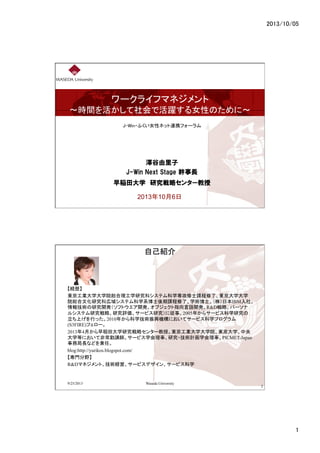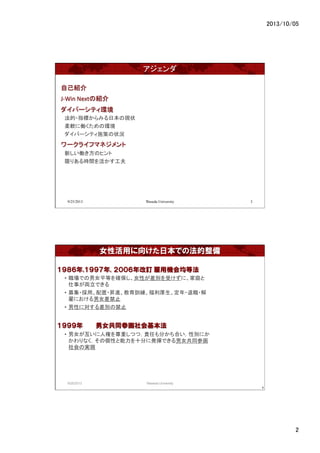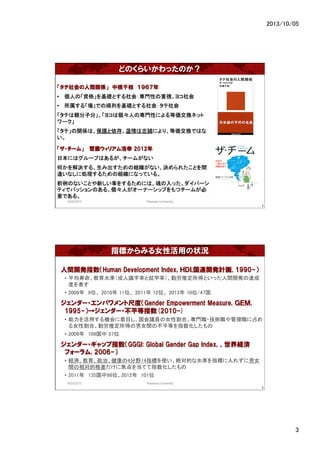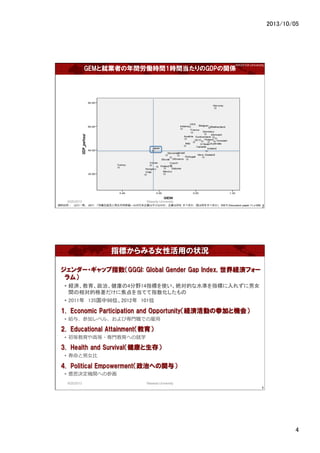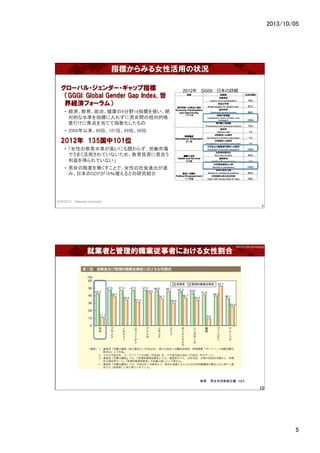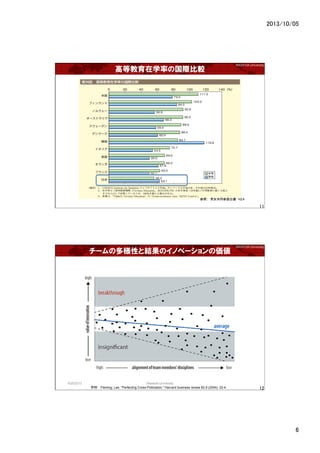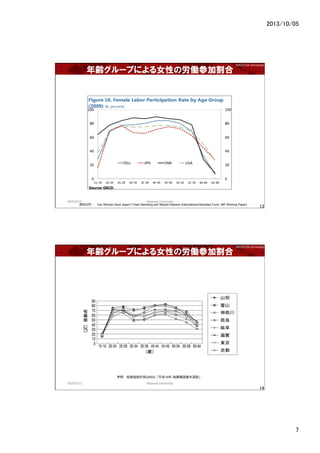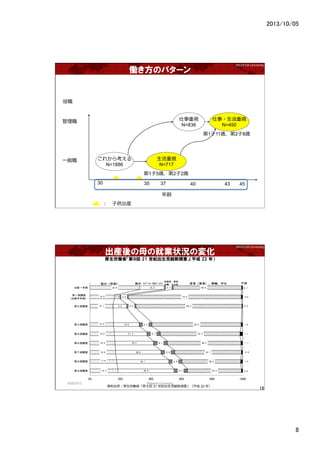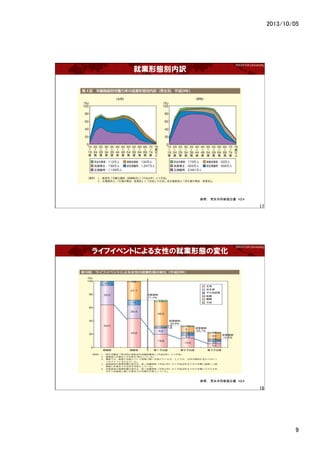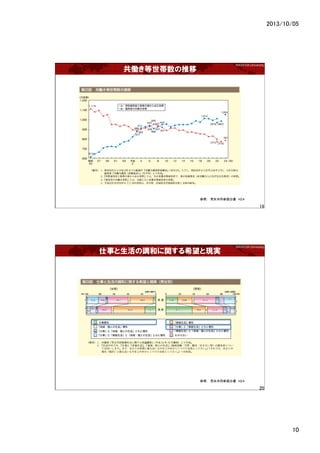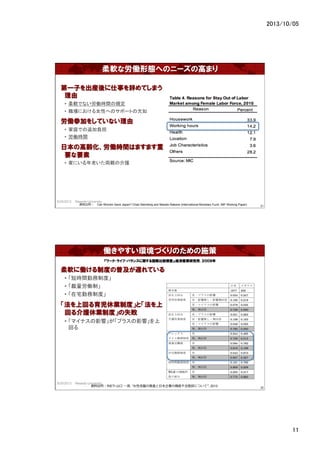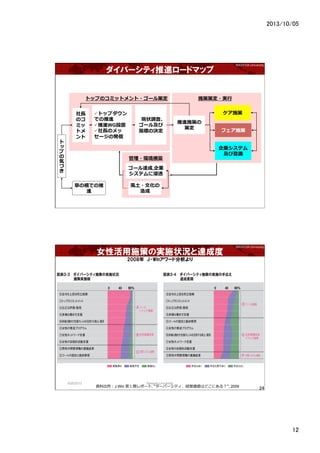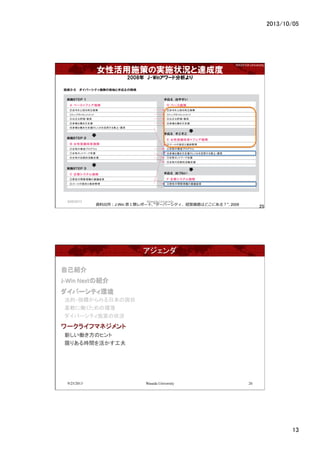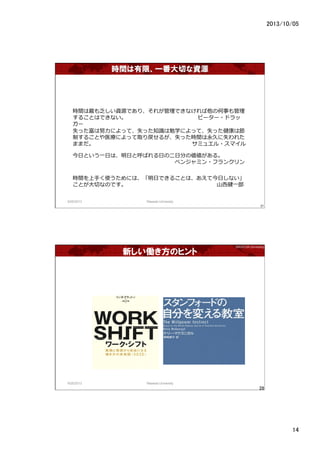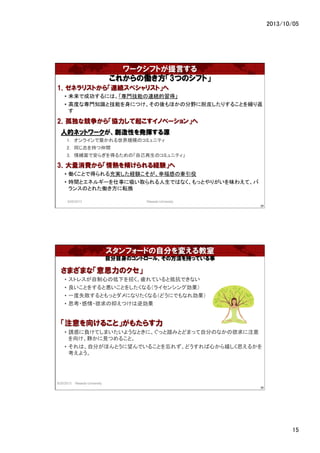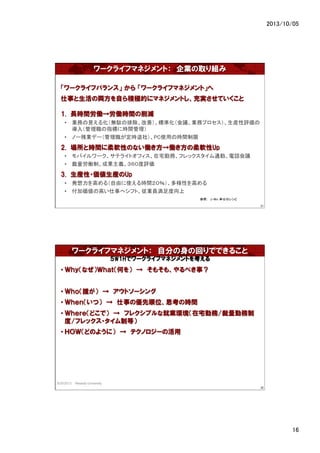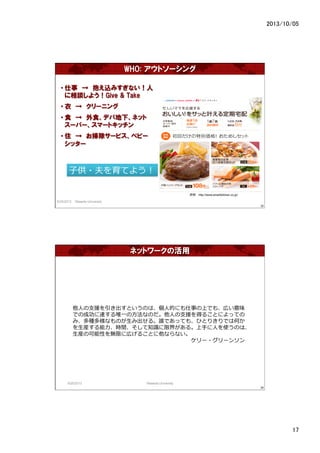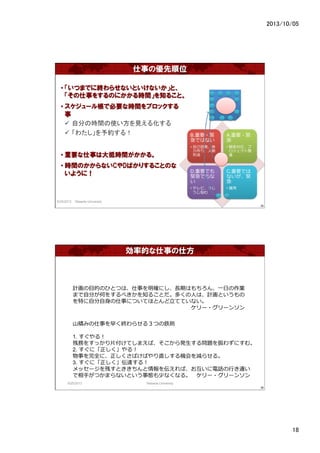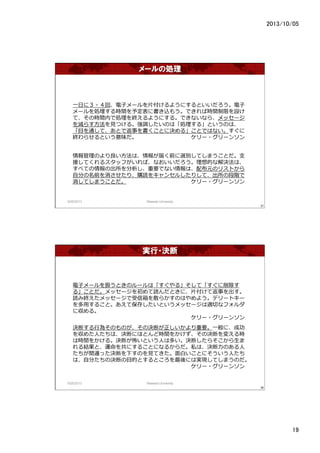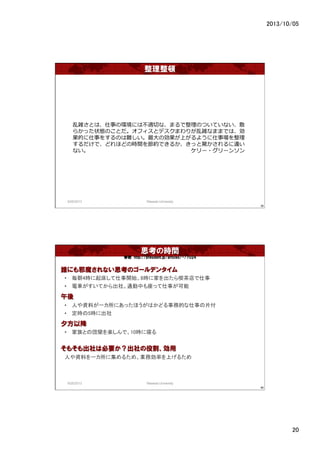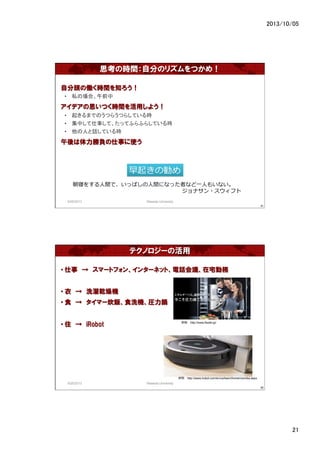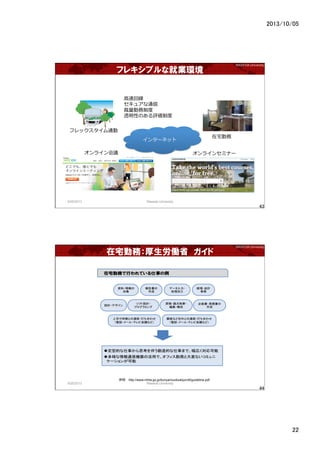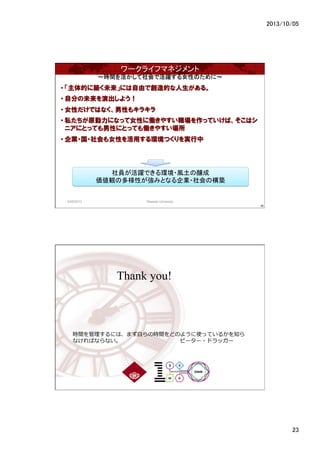Work-Life Management
- 1. 2013/10/05 1 ワークライフマネジメント ?時間を活かして社会で活躍する女性のために? 澤谷由里子 J-Win ?Next ?Stage ?幹事長 早稲田大学 研究戦略センター教授 2013年10月6日 J-Win?ふくい女性ネット連携フォーラム 自己紹介 9/25/2013 Waseda University 2 【経歴】 東京工業大学大学院総合理工学研究科システム科学専攻修士課程修了、東京大学大学 院総合文化研究科広域システム科学系博士後期課程修了、学術博士。(株)日本IBM入社。 情報技術の研究開発(ソフトウエア開発、オブジェクト指向言語開発、R&D戦略、パーソナ ルシステム研究戦略、研究評価、サービス研究)に従事。2005年からサービス科学研究の 立ち上げを行った。2010年から科学技術振興機構においてサービス科学プログラム (S3FIRE)フェロー。 2013年4月から早稲田大学研究戦略センター教授。東京工業大学大学院、東京大学、中央 大学等において非常勤講師。サービス学会理事、研究?技術計画学会理事、PICMET-Japan 事務局長などを兼任。 blog:http://yurikos.blogspot.com/ 【専門分野】 R&Dマネジメント、技術経営、サービスデザイン、サービス科学
- 2. 2013/10/05 2 アジェンダ 自己紹介 ? J-?‐Win ?Nextの紹介 ? ? ダイバーシティ環境 ? 法的?指標からみる日本の現状 ? 柔軟に働くための環境 ? ダイバーシティ施策の状況 ? ワークライフマネジメント ? 新しい働き方のヒント ? 限りある時間を活かす工夫 ? 9/25/2013 Waseda University 3 女性活用に向けた日本での法的整備 1986年,1997年, ?2006年改訂 雇用機会均等法 ?? 職場での男女平等を確保し、女性が差別を受けずに、家庭と 仕事が両立できる ?? 募集?採用、配置?昇進、教育訓練、福利厚生、定年?退職?解 雇における男女差禁止 ?? 男性に対する差別の禁止 1999年 男女共同参画社会基本法 ?? 男女が互いに人権を尊重しつつ,責任も分かち合い,性別にか かわりなく,その個性と能力を十分に発揮できる男女共同参画 社会の実現 9/25/2013 Waseda University 4
- 3. 2013/10/05 3 どのくらいかわったのか? 「タテ社会の人間関係」 中根千枝 1967年 ?? 個人の「資格」を基礎とする社会:専門性の重視、ヨコ社会 ?? 所属する「場」での順列を基礎とする社会:タテ社会 「タテは親分子分」、「ヨコは個々人の専門性による等価交換ネット ワーク」 「タテ」の関係は、保護と依存、温情は忠誠により、等価交換ではな い。 「ザ?チーム」 ? 齋藤ウィリアム浩幸 ?2012年 日本にはグループはあるが、チームがない 何かを解決する、生み出すための組織がない、決められたことを間 違いなしに処理するための組織になっている。 前例のないことや新しい事をするためには、魂の入った、ダイバーシ ティでパッションのある、個々人がオーナーシップをもつチームが必 要である。 9/25/2013 Waseda University 5 指標からみる女性活用の状況 人間開発指数(Human ?Development ?Index, ?HDI,国連開発計画, ?1990-) ?? 平均寿命、教育水準(成人識字率と就学率)、勤労推定所得といった人間開発の達成 度を表す ?? 2009年 9位、 2010年 11位、 2011年 12位、 2013年 10位/47国 ジェンダー?エンパワメント尺度(Gender ?Empowerment ?Measure, ?GEM, ? 1995-)→ジェンダー?不平等指数(2010-) ?? 能力を活用する機会に着目し、国会議員の女性割合、専門職?技術職や管理職に占め る女性割合、勤労推定所得の男女間の不平等を指数化したもの ?? 2009年 109国中 57位 ジェンダー?ギャップ指数(GGGI: ?Global ?Gender ?Gap ?Index, ?、世界経済 フォーラム, ?2006-) ?? 経済、教育、政治、健康の4分野14指標を使い、絶対的な水準を指標に入れずに男女 間の相対的格差だけに焦点を当てて指数化したもの ?? 2011年 135国中98位、2012年 101位 9/25/2013 Waseda University 6
- 4. 2013/10/05 4 WASEDA University GEMと就業者の年間労働時間1時間当たりのGDPの関係 9/25/2013 Waseda University 7 資料料出所:? ?山?口?一男。 ?2011. 「労働?生産性と男?女女共同参画―なぜ?日本企業はダメなのか、企業は何を ?すべきか、国は何をすべきか」 ?RIETI Discussion paper 11-J-069. 指標からみる女性活用の状況 ジェンダー?ギャップ指数(GGGI: ?Global ?Gender ?Gap ?Index, ?世界経済フォー ラム) ?? 経済、教育、政治、健康の4分野14指標を使い、絶対的な水準を指標に入れずに男女 間の相対的格差だけに焦点を当てて指数化したもの ?? 2011年 135国中98位、2012年 101位 1.? Economic ?Participation ?and ?Opportunity(経済活動の参加と機会) ?? 給与、参加レベル、および専?門職での雇?用 2.? Educational ?Attainment(教育) ?? 初等教育や?高等?専?門教育への就学 3.? Health ?and ?Survival(健康と生存) ?? 寿命と男?女女?比 4.? Political ?Empowerment(政治への関与) ?? 意思決定機関への参画 9/25/2013 Waseda University 8
- 5. 2013/10/05 5 指標からみる女性活用の状況 グローバル?ジェンダー?ギャップ指標 (GGGI: ?Global ?Gender ?Gap ?Index, ?世 界経済フォーラム) ?? 経済、教育、政治、健康の4分野14指標を使い、絶 対的な水準を指標に入れずに男女間の相対的格 差だけに焦点を当てて指数化したもの ?? 2008年以来、98位、101位、94位、98位 2012年 135国中101位 ?? 「女性の教育水準が高いにも関わらず、労働市場 でうまく活用されていないため、教育投資に見合う 利益を得られていない」 ?? 男女の格差を無くすことで、女性の社会進出が進 み、日本のGDPが16%増えるとの研究紹介 9 9/25/2013 Waseda University 指標 副指標 ?日本の順位 経済活動への参加と機会 Economic Participation and Opportunity 102位 労働参加 78位Labour force participation 賃?金金の平等 97位Wage equality for similar work 勤労所得 80位Estimated earned income 幹部や管理理職 106位 Legislators, senior of?cials, and managers 専?門職と技術職 73位Professional and technical workers 教育達成 Educational Attainment 81位 識識字率率率 1位Literacy rate 初等教育への就学 1位Enrolment in primary education 中等教育への就学 1位Enrolment in secondary education ?大学および職業専?門教育への就学 100位Enrolment in tertiary education 健康と生存 Health and Survival 34位 出?生時の男?女女?比 93位Sex ratio at birth 健康寿命 1位Healthy life expectancy 政治への関与 Political Empowerment 110位 ?女女性国会議員の?人数 102位Women in parliament ?女女性?大?臣の?人数 83位Women in ministerial positions ?女女性国家元?首の在位年年数 58位Years with female head of state 2012年年? GGGI? ?日本の詳細 WASEDA University 就業者と管理的職業従事者における女性割合 10 参照: 男女共同参画白書 H24
- 6. 2013/10/05 6 WASEDA University 高等教育在学率の国際比較 11 参照: 男女共同参画白書 H24 WASEDA University チームの多様性と結果のイノベーションの価値 9/25/2013 Waseda University 12 参照? Fleming, Lee. "Perfecting Cross-Pollination." Harvard business review 82.9 (2004): 22-4.
- 7. 2013/10/05 7 WASEDA University 年齢グループによる女性の労働参加割合 9/25/2013 Waseda University 13 資料料出所:? Can Women Save Japan? Chad Steinberg and Masato Nakane (International Monetary Fund, IMF Working Paper) WASEDA University 年齢グループによる女性の労働参加割合 日本の地域別 9/25/2013 Waseda University 14 参照? 総務省省統計局(2002)「平成14年年 ?就業構造基本調査」 ?
- 8. 2013/10/05 8 WASEDA University 働き方のパターン これから考える N=1886 ?生活重視 N=717 仕事??生活重視 N=450 仕事重視 N=836 30 40 45 ?一般職 管理理職 役職 年年齢 433735 :? ?子供出産 第1?子5歳、第2?子2歳 第1?子11歳、第2?子8歳 WASEDA University 出産後の母の就業状況の変化 厚生労働省「第9回 ?21 ?世紀出生児縦断調査」(平成 ?22 ?年) 9/25/2013 Waseda University 16 資料料出所:厚?生労働省省「第9回 ?21 世紀出?生児縦断調査」(平成 ?22 年年)
- 11. 2013/10/05 11 柔軟な労働形態へのニーズの高まり 第一子を出産後に仕事を辞めてしまう 理由 ?? 柔軟でない労働時間の規定 ?? 職場における女性へのサポートの欠如 労働参加をしていない理由 ?? 家庭での追加負担 ?? 労働時間 日本の高齢化、労働時間はますます重 要な要素 ?? 家にいる年老いた両親の介護 21 9/25/2013 Waseda University 資料料出所:? Can Women Save Japan? Chad Steinberg and Masato Nakane (International Monetary Fund, IMF Working Paper) 働きやすい環境づくりのための施策 『ワーク?ライフ?バランスに関する国際比較調査』,経済産業研究所, ?2009年 柔軟に働ける制度の普及が遅れている ?? 「短時間勤務制度」 ?? 「裁量労働制」 ?? 「在宅勤務制度」 「法を上回る育児休業制度」と「法を上 回る介護休業制度」の失敗 ?? 「マイナスの影響」が「プラスの影響」を上 回る 22 9/25/2013 Waseda University 資料料出所:RIETI ?山?口 ??一男, “?女女性活躍の推進と?日本企業の機能不不全脱却について”, 2013
- 12. 2013/10/05 12 WASEDA University ダイバーシティ推進ロードマップ 社??長 のコ ミッ トメ ント ü??トップダウン での推進 ü??推進WG設置 ü??社??長のメッ セージの発信 草の根での推 進 現状調査、 ゴール及び 指標の決定 推進施策の 策定 ケア施策 フェア施策 企業システム 及び意識識 トップのコミットメント?ゴール策定 施策策定?実?行行 ゴール達成,企業 システムに浸透 管理理?環境構築 ト プ の 気 づ き ?風?土??文化の 造成 WASEDA University 女性活用施策の実施状況と達成度 2008年 J-Winアワード分析より 9/25/2013 Waseda University 24 資料料出所:J-Win 第1期レポート, “ダーバーシティ、経営価値はどこにある?”, 2009
- 13. 2013/10/05 13 WASEDA University 女性活用施策の実施状況と達成度 2008年 J-Winアワード分析より 9/25/2013 Waseda University 25 資料料出所:J-Win 第1期レポート, “ダーバーシティ、経営価値はどこにある?”, 2009 アジェンダ 自己紹介 ? J-?‐Win ?Nextの紹介 ? ? ダイバーシティ環境 ? 法的?指標からみる日本の現状 ? 柔軟に働くための環境 ? ダイバーシティ施策の状況 ? ワークライフマネジメント ? 新しい働き方のヒント ? 限りある時間を活かす工夫 ? 9/25/2013 Waseda University 26
- 14. 2013/10/05 14 時間は有限、一番大切な資源 9/25/2013 Waseda University 27 時間は最も乏しい資源であり、それが管理理できなければ他の何事も管理理 することはできない。? ? ? ? ? ? ? ? ? ? ? ? ? ? ? ? ? ? ? ? ? ? ? ? ? ? ?ピーター?ドラッ ガー 今?日という?一?日は、明?日と呼ばれる?日の?二?日分の価値がある。 ? ? ? ? ? ? ? ? ? ? ? ? ? ? ? ? ? ? ? ベンジャミン?フランクリン 失った富は努?力力によって、失った知識識は勉学によって、失った健康は節 制することや医療療によって取り戻せるが、失った時間は永久に失われた ままだ。 ? ? ? ? ? ? ? ? ? ? ? ? ? ? ? サミュエル?スマイル 時間を上?手く使うためには、「明?日できることは、あえて今?日しない」 ことが?大切切なのです。? ? ? ? ? ? ? ? ? ? ? ? ? ? ? ? ? ? ? ? ? ? ? ? ? ? ? ? ? ??山?西健?一郎郎 WASEDA University 新しい働き方のヒント 9/25/2013 Waseda University 28
- 15. 2013/10/05 15 ワークシフトが提言する これからの働き方「3つのシフト」 1.ゼネラリストから「連続スペシャリスト」へ ?? 未来で成功するには、「専門技能の連続的習得」 ?? 高度な専門知識と技能を身につけ、その後もほかの分野に脱皮したりすることを繰り返 す 2.孤独な競争から「協力して起こすイノベーション」へ 人的ネットワークが、創造性を発揮する源 1.? オンラインで築かれる世界規模のコミュニティ 2.? 同じ志を持つ仲間 3.? 情緒面で安らぎを得るための「自己再生のコミュニティ」 3.大量消費から「情熱を傾けられる経験」へ ?? 働くことで得られる充実した経験こそが、幸福感の牽引役 ?? 時間とエネルギーを仕事に吸い取られる人生ではなく、もっとやりがいを味わえて、バ ランスのとれた働き方に転換 9/25/2013 Waseda University 29 スタンフォードの自分を変える教室 自分自身のコントロール、その方法を持っている事 さまざまな「意思力のクセ」 ?? ストレスが自制心の低下を招く、疲れていると抵抗できない ?? 良いことをすると悪いことをしたくなる(ライセンシング効果) ?? 一度失敗するともっとダメになりたくなる(どうにでもなれ効果) ?? 思考?感情?欲求の抑えつけは逆効果 「注意を向けること」がもたらす力 ?? 誘惑に負けてしまいたいようなときに、ぐっと踏みとどまって自分のなかの欲求に注意 を向け、静かに見つめること。 ?? それは、自分がほんとうに望んでいることを忘れず、どうすれば心から嬉しく思えるかを 考えよう。 30 9/25/2013 Waseda University
- 16. 2013/10/05 16 ワークライフマネジメント: 企業の取り組み 「ワークライフバランス」 ?から ?「ワークライフマネジメント」へ 仕事と生活の両方を自ら積極的にマネジメントし、充実させていくこと 1.? 長時間労働→労働時間の削減 ?? 業務の見える化(無駄の排除、改善)、標準化(会議、業務プロセス)、生産性評価の 導入(管理職の指標に時間管理) ?? ノー残業デー(管理職が定時退社)、PC使用の時間制限 2.? 場所と時間に柔軟性のない働き方→働き方の柔軟性Up ?? モバイルワーク、サテライトオフィス、在宅勤務、フレックスタイム通勤、電話会議 ?? 裁量労働制、成果主義、360度評価 3.? 生産性?価値生産のUp ?? 発想力を高める(自由に使える時間20%)、多様性を高める ?? 付加価値の高い仕事へシフト、従業員満足度向上 31 参照: J-Win 幸せのレシピ ワークライフマネジメント: 自分の身の回りでできること 5W1Hでワークライフマネジメントを考える ??Why(なぜ)What(何を) → そもそも、やるべき事? ??Who(誰が) → アウトソーシング ??When(いつ) → 仕事の優先順位、思考の時間 ??Where(どこで) → フレクシブルな就業環境(在宅勤務/裁量勤務制 度/フレックス?タイム制等) ??HOW(どのように) → テクノロジーの活用 32 9/25/2013 Waseda University
- 17. 2013/10/05 17 WHO: ?アウトソーシング ??仕事 → 抱え込みすぎない!人 に相談しよう!Give ?& ?Take ??衣 → クリーニング ??食 → 外食、デパ地下、ネット スーパー、スマートキッチン ??住 → お掃除サービス、ベビー シッター 33 9/25/2013 Waseda University 参照? http://www.smartkitchen.co.jp/ ?子供?夫を育てよう! ネットワークの活用 9/25/2013 Waseda University 34 他?人の?支援を引き出すというのは、個?人的にも仕事の上でも、広い意味 での成功に達する唯?一の?方法なのだ。他?人の?支援を得ることによっての み、多種多様なものが?生み出せる。誰であっても、ひとりきりでは何か を?生産する能?力力、時間、そして知識識に限界がある。上?手に?人を使うのは、 ?生産の可能性を無限に広げることに他ならない。? ? ? ? ? ? ? ? ? ? ? ? ? ? ? ? ? ? ? ? ? ? ? ? ? ? ? ? ? ? ? ? ? ? ? ? ? ? ? ? ? ? ? ? ? ? ? ケリー?グリーンソン
- 18. 2013/10/05 18 仕事の優先順位 ??「いつまでに終わらせないといけないか」と、 「その仕事をするのにかかる時間」を知ること。 ??スケジュール帳で必要な時間をブロックする 事 ü?? 自分の時間の使い方を見える化する ü?? 「わたし」を予約する! ??重要な仕事は大抵時間がかかる。 ??時間のかからないCやDばかりすることのな いように! 35 9/25/2013 Waseda University B.重要?緊 急ではない ?? ?自?己啓発、体 ?力力作り、?人脈 形成 A.重要?緊 急 ?? 顧客対応、プ ロジェクト推 進 D.重要でも 緊急でもな い ?? テレビ、うじ うじ悩む C.重要では ないが、緊 急 ?? 雑?用 効率的な仕事の仕方 9/25/2013 Waseda University 36 ?山積みの仕事を早く終わらせる3つの鉄則 1. すぐやる! 残務をすっかり?片付けてしまえば、そこから発?生する問題を扱わずにすむ。 2. すぐに「正しく」やる! 物事を完全に、正しくさばけばやり直しする機会を減らせる。 3. すぐに「正しく」伝達する! メッセージを残すとききちんと情報を伝えれば、お互いに電話の?行行き違い で相?手がつかまらないという事態も少なくなる。? ケリー?グリーンソン 計画の?目的のひとつは、仕事を明確にし、??長期はもちろん、?一?日の作業 まで?自分が何をするべきかを知ることだ。多くの?人は、計画というもの を特に?自分?自?身の仕事についてほとんど?立立てていない。 ? ? ? ? ? ? ? ? ? ? ? ? ? ? ? ? ? ? ? ? ? ? ケリー?グリーンソン
- 19. 2013/10/05 19 メールの処理 9/25/2013 Waseda University 37 情報管理理のより良良い?方法は、情報が届く前に選別してしまうことだ。?支 援してくれるスタッフがいれば、なおいいだろう。理理想的な解決法は、 すべての情報の出所を分析し、重要でない情報は、配布元のリストから ?自分の名前を消させたり、購読をキャンセルしたりして、出所の段階で 消してしまうことだ。? ? ? ? ? ? ? ? ? ? ? ? ケリー?グリーンソン ?一?日に3?4回、電?子メールを?片付けるようにするといいだろう。電?子 メールを処理理する時間を予定表に書き込もう。できれば時間制限を設け て、その時間内で処理理を終えるようにする。できないなら、メッセージ を減らす?方法を?見見つける。強調したいのは「処理理する」というのは、 「?目を通して、あとで返事を書くことに決める」ことではない。すぐに 終わらせるという意味だ。? ? ? ? ? ? ? ? ? ? ケリー?グリーンソン 実行?決断 9/25/2013 Waseda University 38 電?子メールを扱うときのルールは「すぐやる」そして「すぐに削除す る」ことだ。メッセージを初めて読んだときに、?片付けて返事を出す。 読み終えたメッセージで受信箱を散らかすのはやめよう。デリートキー を多?用すること。あえて保存したいというメッセージは適切切なフォルダ に収める。? ? ? ? ? ? ? ? ? ? ? ? ? ? ? ? ? ? ? ? ? ? ? ? ? ? ケリー?グリーンソン 決断する?行行為そのものが、その決断が正しいかより重要。?一般に、成功 を収めた?人たちは、決断にほとんど時間をかけず、その決断を変える時 は時間をかける。決断が怖いという?人は多い。決断したらそこから?生ま れる結果と、運命を共にすることになるからだ。私は、決断?力力のある?人 たちが間違った決断を下すのを?見見てきた。?面?白いことにそういう?人たち は、?自分たちの決断の?目的とするところを最後には実現してしまうのだ。? ? ? ? ? ? ? ? ? ? ? ? ? ? ? ? ? ? ? ? ? ? ? ? ケリー?グリーンソン
- 20. 2013/10/05 20 整理整頓 9/25/2013 Waseda University 39 乱雑さとは、仕事の環境には不不適切切な、まるで整理理のついていない、散 らかった状態のことだ。オフィスとデスクまわりが乱雑なままでは、効 果的に仕事をするのは難しい。最?大の効果が上がるように仕事場を整理理 するだけで、どれほどの時間を節約できるか、きっと驚かされるに違い ない。? ? ? ? ? ? ? ? ? ? ? ? ? ? ? ? ? ? ? ケリー?グリーンソン 思考の時間 参照 http://president.jp/articles/-/7024 誰にも邪魔されない思考のゴールデンタイム ?? 毎朝4時に起床して仕事開始。8時に家を出たら喫茶店で仕事 ?? 電車がすいてから出社。通勤中も座って仕事が可能 午後 ?? 人や資料が一カ所にあったほうがはかどる事務的な仕事の片付 ?? 定時の5時に出社 夕方以降 ?? 家族との団欒を楽しんで、10時に寝る そもそも出社は必要か?出社の役割、効用 人や資料を一カ所に集めるため、業務効率を上げるため 9/25/2013 Waseda University 40
- 21. 2013/10/05 21 思考の時間:自分のリズムをつかめ! 自分頭の働く時間を知ろう! ?? 私の場合、午前中 アイデアの思いつく時間を活用しよう! ?? 起きるまでのうつらうつらしている時 ?? 集中して仕事して、たってふらふらしている時 ?? 他の人と話している時 午後は体力勝負の仕事に使う 9/25/2013 Waseda University 41 朝寝をする?人間で、いっぱしの?人間になった者など?一?人もいない。 ? ? ? ? ? ? ? ? ? ? ? ? ? ?? ? ? ? ? ? ? ジョナサン?スウィフト 早起きの勧め テクノロジーの活用 ??仕事 → スマートフォン、インターネット、電話会議、在宅勤務 ??衣 → 洗濯乾燥機 ??食 → タイマー炊飯、食洗機、圧力鍋 ??住 → iRobot 9/25/2013 Waseda University 42 参照? http://www.irobot.com/en/us/learn/home/roomba.aspx 参照? http://www.fissler.jp/
- 22. 2013/10/05 22 WASEDA University フレキシブルな就業環境 9/25/2013 Waseda University 43 インターネット オンライン会議 オンラインセミナー 在宅宅勤務 フレックスタイム通勤 ?高速回線 セキュアな通信 裁量量勤務制度度 透明性のある評価制度度 WASEDA University 在宅勤務:厚生労働省 ガイド 9/25/2013 Waseda University 44 参照? http://www.mhlw.go.jp/bunya/roudoukijun/dl/guideline.pdf
- 23. 2013/10/05 23 ワークライフマネジメント ?時間を活かして社会で活躍する女性のために? ??「主体的に築く未来」には自由で創造的な人生がある。 ??自分の未来を演出しよう! ??女性だけではなく、男性もキラキラ ??私たちが原動力になって女性に働きやすい職場を作っていけば、そこはシ ニアにとっても男性にとっても働きやすい場所 ??企業?国?社会も女性を活用する環境つくりを実行中 9/25/2013 Waseda University 45 社員が活躍できる環境?風土の醸成 価値観の多様性が強みとなる企業?社会の構築 Thank you! 時間を管理理するには、まず?自らの時間をどのように使っているかを知ら なければならない。? ? ? ? ? ? ? ? ? ? ? ? ? ? ? ? ? ? ? ? ? ?? ? ピーター?ドラッガー

